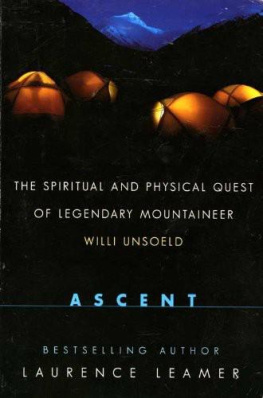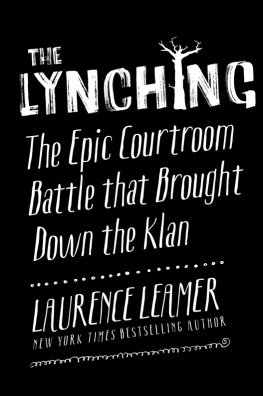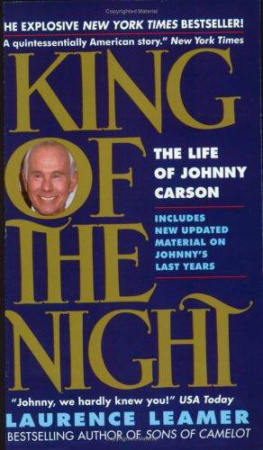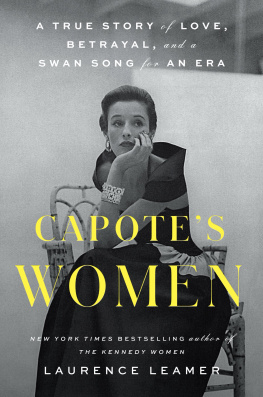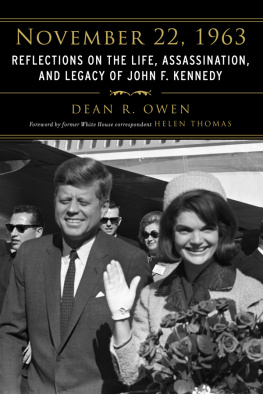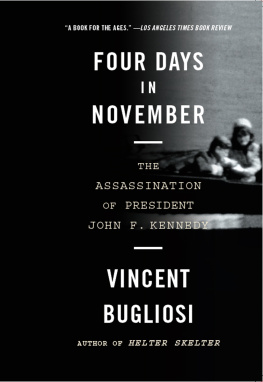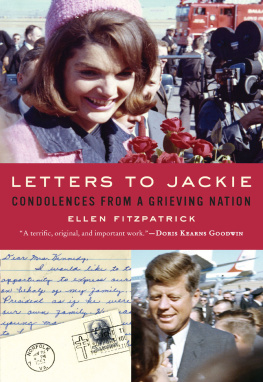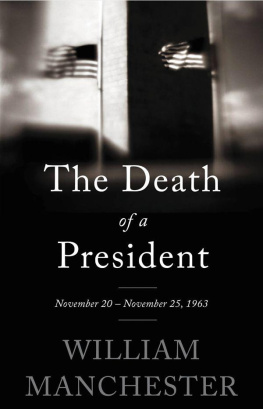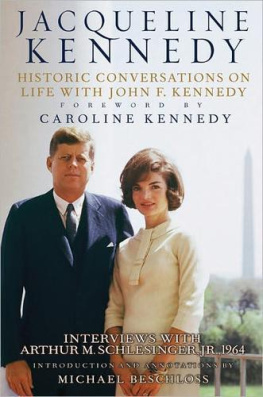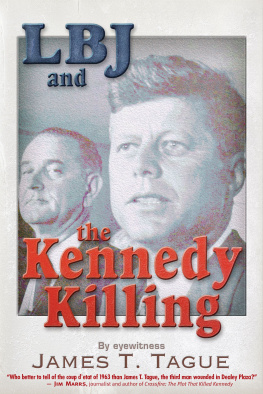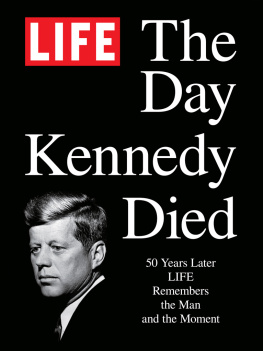The
KENNEDY
MEN
1901-1963
The Laws of the Father
L AURENCE L EAMER

TO MY FATHER
LAURENCE E. LEAMER
AND
IN MEMORY OF MY FRIEND
DR. STEPHEN A. COLE (1940-2000)
1
A True Man
T welve-year-old Joseph Patrick Kennedy may have been dressed like a young gentleman, but he walked with the bold strut of an Irish tough full of the lore of the streets. As he hurried down Webster Street, his blue eyes exuded a hungry intensity for whatever life might offer. He was taller than most boys his age and had reddish hair and an abruptness to his features that left him just short of handsome. His strong, willful face had already lost whatever boyish innocence it once held.
Joe had been brought up on the island enclave of East Boston and knew the streets and byways with perfect acumen. Today, for the first time, he would be traveling without his family to the proud city across the bay. He would be passing through streets full of uncertainty, confronting strange new people. It was a prospect that would have filled many youths with apprehension, but nothing in Joes demeanor suggested that he was worried about the adventure.
Joes mother, Mary Augusta Hickey Kennedy, had arranged for her only son to deliver hats from a prestigious shop to the great ladies of Boston. Before Joe set off on his delivery in the summer in 1901, Mary Augusta looked at her son with what the family called Hickey eyes. They were piercing, dismissive eyes that with a mere glance could stop a vulgarity in midsentence or send a supplicant reeling backward in shame. Joes mother admonished him to behave impeccably and to refer to himself as the proper Joseph, not the vulgar Joe.
Joe rushed off down the street from the Kennedys two-story home located in the best residential area. From up here on the highest elevation on the island, Joe could look down far below where passenger ships glided into the harbor packed with immigrants. Driven from their land by the great potato famine, between 1846 and 1849 nearly one hundred thousand Irish immigrants had arrived on Bostons pristine shores. Among them were Joes grandparents. Patrick Kennedy had disembarked in 1849 on these very streets, where he and his bride, Bridget Murphy, set up residence in a tiny apartment.
After only nine years in East Boston, Joes grandfather died. He left his thirty-seven-year-old widow with four children under the age of eight and an estate of seventy-five dollars. Bridget worked first as a servant but eventually found a job in a small variety store only a few blocks from where Joe now walked. In what was a difficult accomplishment for an immigrant widow, Bridget managed to buy the store.
Joe found his way to the hat shop and stepped up into the horse-driven wagon. As the driver guided the horse through the streets, the air was full of the stench of horse manure, the foul odor of rendering plants, the fumes of the steamers, the acrid malodor of the New England Pottery Company, and the smells of the Atlantic Steel Works.
The carriage rolled toward the mainland ferry, passing numerous taverns, dark havens that marked their presence by small signs. If Joes father, Patrick Joseph P. J. Kennedy, had set a symbol of his success on his mantelpiece, it would have been a humble glass of beer. As a youth, P. J. worked a short while as a stevedore. Then P. J.s mother had grubstaked her only son to open a pub. As for her daughters, Bridget followed the pattern of her people and her time. She sent one daughter off to work in the jute mills and settled for another to become a shirtmaker, while she did everything for her son.
P. J. drank only enough so that he would not appear a parsimonious sort, his shot glass filled not with whiskey but with beer. In P. J.s tavern, as in most others in East Boston, the talk was usually of politics. P. J. carefully built his clientele, expanded into the wholesale liquor business, and entered politics as a state legislator. Favors were the mortar of P. J.s career, and he built his career one brick at a time.
By the time Joe was born, P. J. was the Democratic ward boss for East Boston, one of the most powerful political figures in the city. With his husky figure and handlebar mustache, P. J. appeared the perfect rendering of an Irish-American politician. Every evening the petitioners arrived at the house on Webster Street, bewildered new arrivals clutching legal notices, unemployed workers looking for a city job, and widows about to be evicted.
As the carriage turned onto Meridian Square and the ferry landing, it passed the Columbia Trust Company, an imposing four-story brick and iron building. Joes father was a founder of this new bank, one of the many businesses in which he was involved. The East Boston Argus-Advocate, in a rare moment of candor, described P. J. as slick as grease. Slick as grease he was, and slick as grease he had to be to climb out of the prison of poverty and accumulate a fortune, all without ever moving from East Boston.
When a husband died, P. J. was there with his condolences, but he was also there to buy the widows house at a good price. He and his business associates bought extensive real estate and other businesses in East Boston, usually keeping their interest quiet. P. J. used his political power as a lever to push him into all kinds of deals, including a major position in the liquor wholesale business, an industry that he helped oversee in the state legislature.
No matter how well off he became, P. J. never flaunted his wealth. Though he sailed a yacht in the harbor in the summer and wintered in Florida, he still rode the trolley and tipped his hat to the ladies.
P. J. was a shrewd, practical man who endowed his son with his own deep insight into all the machinations of human beings. He was a man, however, who had none of his wifes overweening ambition, a man who saw East Boston as world enough for himself and for his son.
Everywhere Joe cast his eyes, he spied new arrivals from the ports of Europe and heard the rancorous clamor of peddlers. The horse-drawn wagon brushed past Russian and other Eastern European Jews selling goods from pushcarts and gesticulating Italians hawking sausages and vegetables where thirty years before Irish widows had begged passersby for a coin or two. These new immigrants, especially the Jews, were an exotic, threatening element to Irish-Americans. They were pouring into East Boston, crammed into triple-decker houses and tenements. There would soon be enough of them to become the largest Jewish community in New England, and by the time they founded their synagogues and opened kosher markets, the second-generation Irish-Americans were pulling out. Joes father could have left too, but this was his political bailiwick, and he was not giving it up to these new arrivals.
The carriage waited in line before moving onto the ferry that sailed between East Boston and Boston proper on the mainland. The pedestrians hurried onto the boat, paying their one-penny fares and passing through the turnstile to share the ride with a polyglot cross section of Irish, Italians, Jews, businessmen, shrouded widows, and youths. Teamsters quieted their teams of horses while peddlers shoved their pushcarts aboard.
The ferry, like the island community itself, was an inelegant, practical affair, a low-bottomed vessel with a long smokestack set amidships, belching a spume of black smoke into the air. As the ferry approached Battery Wharf, Joe saw the commerce of Boston in all its diversity. Joes immigrant grandfather Patrick had been a cooper, a barrel-maker. Wooden barrels full of foodstuffs and sundry items rested everywhere along the wharves, sitting on horse-drawn wagons or standing dockside waiting to be lifted onto the ships.
Next page

